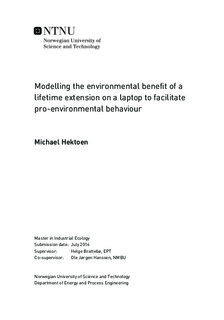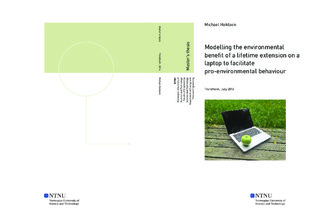| dc.description.abstract | Consumption of household goods is one of the main drivers behind several environmental impacts, including emission of greenhouse gases. Lifetime extension has been proposed as a strategy to mitigate emissions. Keeping products in use through service and repairs can replace the need for new purchase and thereby reduce the overall impacts associated with material extraction, manufacturing, recycling and transport. In this thesis, a scenario model is developed to compare the environmental impacts of a base-scenario where a laptop s replaced after 4 years, which is the current average lifetime of laptops, with a lifetime extension scenario where an overhaul is performed after 4 years, giving the laptop 2 additional years. In addition, a consumer survey is performed on inhabitants of Ås municipality and students at the Norwegian University of Life Sciences to identify: a. whether consumers are aware of the environmental impacts associated with household goods, focusing on the greenhouse gas emissions from the production phase; and b. whether more information of the environmental impacts potentially can encourage consumers to pro-environmental behaviour. Results show a clear environmental benefit in the lifetime extension scenario, with a 20 percent difference in cumulative GHG-emissions over a 12 year period. Results from the survey indicate a low level of awareness among consumers of the environmental impacts associated with household goods, but at the same time the expressed belief that such information should be more available and that it can in fact influence behaviour in a pro-environmental direction. Building on the results, the development of a tool is proposed which can visualize the environmental and economic benefits of lifetime extension on a wider range of products in order to create awareness among consumers and stimulate to pro-environmental behaviour. Further research on lifetime extension of household goods is suggested. | |

